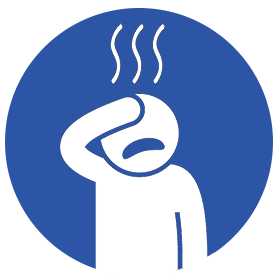Common Side Effects of Chemotherapy
 Nausea and Vomiting
Nausea and Vomiting
Some of the chemotherapy can cause nausea and vomiting. Nausea is when you are feeling sick to your stomach. Nausea and vomiting may occur hours to days after your treatment. You can have difference types of medication during your treatment that will help with nausea and vomiting.
Some ways to help with the nausea and vomiting:
- Eat small meals often
- Avoid fatty, fried or spicy foods
- Stay in a sitting position for 30-60 minutes after your meals
- Take clear fluids such as broth, sports drinks, water
See the Cancer Care Ontario Symptom Management Guide on Nausea and Vomiting »
Mouth Sores (Mucositis)
Chemotherapy can cause the lining of your mouth and throat to get swollen and sore. This is called mucositis. It can occur a few days after chemotherapy treatment and can last about 1 week. It can start with a dry, irritating, burning or painful feeling inside the mouth or throat. Good mouth care is important to prevent infections.
To help prevent or relieve mouth sores or sore mouth (mucositis):
- Rinse your mouth often
- Eat soft foods
- Use soft bristled toothbrushes
- Avoid commercial mouthwash with alcohol which can make mouth sores worse
- Avoid spicy, acidic, hard, crunchy foods
See the Cancer Care Ontario Symptom Management Guide on Mouth Sores »
Diarrhea
Diarrhea can be a side effect of chemotherapy treatment. It is important to watch for the frequency and number of times you poop, especially if you have diarrhea. If you lose lots of fluid, you can become dehydrated. It is important to drink lots of fluid when you have diarrhea.
To help diarrhea:
- Eat small amounts often
- Drink lots of fluid
- Eat bland foods such as bananas, rice, toast, applesauce
See the Cancer Care Ontario Symptom Management Guide on Diarrhea »
Fatigue
It is normal to have fatigue (tiredness) while you recover from treatment. While you recover you may feel fatigue. What causes fatigue?
- Low blood counts
- Medications
- Disease
- Your body’s reaction to treatment
- Stress
What can you do to help with your fatigue?
The most important step you can take is listen to your body.
1. Pace yourself
- Take breaks when you first start to feel tired
- Spread out the work you need to do throughout the day
- Take slow breaths
- Try not to rush
- Take naps
2. Plan your activities
- Make lists of your activities
- Do hardest tasks when you have the most energy
- Sit when you can
- Organize your space by keeping items you use the most close by
- Slide heavy items along the counter
- Breathe slowly
- Create a daily routine
- Try to exercise every day
3. Prioritize
- Do what is important first
- Know that it is okay to say “no”
- Sleep is important. Make sure you get a good night’s sleep
4. Make it easier
- Sit when you can
- Keep items close by and within reach
- Use a cart to carry heavy things
- Slide heavy items along the counter
- Use aids to save energy (for example: cane, walker)
- Ask for help
- Eliminate unnecessary tasks
5. Body positioning
- Change your position during the day
- Bend your knees when lifting heavy items
- Sleep on your back or side
6. Managing stress
- Recognize situations that cause you stress
- Use strategies to help you better manage your stress (for example: deep breathing, meditation, mindfulness, exercise)
See the Cancer Care Ontario Symptom Management Guide on Fatigue »






